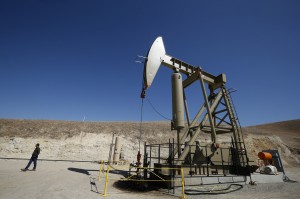How Crude Oil Prices Drive the Cost of Gasoline

Lucy Nicholson/ Reuters/ Landov
An exploratory oil well in California. Oil companies base their decisions to drill around the "benchmark price" of crude oil.
If you’ve followed the drop in oil prices over the last few months you might have noticed the words “Brent” and “WTI” being thrown around without much explanation. The price of these benchmark crude oils influences everything from how big oil companies invest in drilling, to the amount you pay to fill up your car. So what exactly are they?
The first thing to remember is that the crude oil we refine into gasoline comes in a lot of different varieties from all over the world. They have different names and some of them, like Tia Juana Light sound more like a refreshing beverage than an oil.
To make buying and selling all these different crudes simpler. People in the industry use benchmark oil prices. Brent crude, and West Texas Intermediate (or WTI) are the two big ones.
“So somebody will write a contract that says, I will sell you Crude X from the gulf of Mexico at WTI plus a dollar,” says Tim Hess, lead analyst for the US Energy Information Administration’s short term energy outlook.
He says WTI is the price marker for American crudes, “particularly on the Gulf Coast where the petroleum industry is centered.”
For most of the rest of the world, it’s Brent.
Delivery Points
When you sign a contract for Brent the delivery point is in the European North Seas for WTI its Cushing, Oklahoma. That’s important because a lot of oil’s value is tied to how easy it will be to transport.
“That’s one of the things that makes [oil markets] interesting. There’s a geographical component to the products, as well as a blend, that we need to take into account” Ehud Ronn directs the Center for Energy Finance Education and Research at UT Austin.
The price for Brent or WTI is determined not only by traditional supply and demand, but by where financial markets think oil will be priced at out into the future.
“Brent and WTI have futures contracts written around them, they’re traded on financial exchanges, so there’s a very actively traded and liquid price discovery mechanism for those crude oils,” says the EIA’s Hess.
So, if you want to know how much it might cost to fill up your car a year from now, where do you look? A quick review of the last few years helps to answer that question.
When the US oil boom hit, North America was flooded with crude. There were tanks full of West Texas Intermediate sitting around Oklahoma with no way to get it to refineries. Because of that glut of oil, WTI’s price dropped versus Brent.
But that discount never really made it to people filling up their cars.
“There are global markets for crude and there are global markets for gasoline,” explains Jim Krane, a research fellow in energy issues at Rice University’s Baker Institute. “So if refiners in America can buy WTI –can buy US crude at a discount they don’t sell that at a discount, they sell that at the going price. So, in effect, they’re able to capture some additional profits.”
WTI doesn’t influence gasoline prices, but the Brent benchmark does.“If you want to know how the price of oil is going to affect you at the pump. The crude that you should pay attention to most is Brent,” says the EIA’s Tim Hess.
That’s because it is the international benchmark. One crude to rule them all.
“Brent is setting the price of gasoline in all these different markets that the US is both exporting gasoline to and exporting it from,” says Hess. “And because of that link, global gasoline prices are tied to Brent. which makes the US gasoline prices tided to Brent.”


